
Alfonso Cuarón's thriller "Gravity", starring Sandra Bullock and George Clooney as two astronauts stranded in outer space after their shuttle is destroyed, doesn't officially open in theaters until Friday, but it's already being hailed as "the best space movie ever done" by none other than James Cameron himself. We'll see for ourselves soon whether or not "Gravity" lives up to its massive hype. For comparison, here's a comprehensive list of what many people consider the best "space movies" of all time. Where will "Gravity" land on this list? Will it be first, as James Cameron claims? Will it fall somewhere in the middle? Or will it not even make the list? We'll find out Friday.
(Keep in mind that in order to be considered a "space movie", the film actually has to spend a good portion of its running time in space. Sorry, "Contact" and "The Fifth Element".)
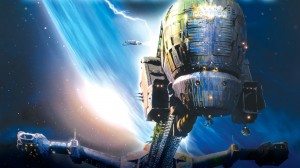 Screenwriter Philip Eisner had no specific plot in mind when he pitched "Event Horizon" to Paramount executives. He simply sold it as "'The Shining' in space", and they ate it up. It was not particularly well-received, critically or commercially, upon its theatrical release, but it has since gained a sort of cult appreciation in the years since. It's basically a horror film that happens to be set in space, as the crew of the spaceship Lewis And Clark investigate the mysterious, abandoned Event Horizon, which was designed to bridge spacetime by creating an artificial black hole. It disappeared during its maiden voyage, but has reappeared seven years later, minus its crew...and plus a sinister, supernatural force. Gruesome effects and the hyper direction of Paul W.S. Anderson ("Resident Evil") make "Event Horizon", if not a masterpiece, then at the very least a scary fun time.
Screenwriter Philip Eisner had no specific plot in mind when he pitched "Event Horizon" to Paramount executives. He simply sold it as "'The Shining' in space", and they ate it up. It was not particularly well-received, critically or commercially, upon its theatrical release, but it has since gained a sort of cult appreciation in the years since. It's basically a horror film that happens to be set in space, as the crew of the spaceship Lewis And Clark investigate the mysterious, abandoned Event Horizon, which was designed to bridge spacetime by creating an artificial black hole. It disappeared during its maiden voyage, but has reappeared seven years later, minus its crew...and plus a sinister, supernatural force. Gruesome effects and the hyper direction of Paul W.S. Anderson ("Resident Evil") make "Event Horizon", if not a masterpiece, then at the very least a scary fun time.
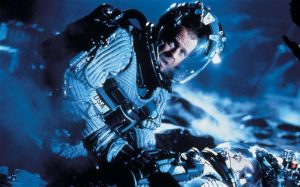 Some directors use the idea of space to explore themes of humanity and our fear of the unknown... Some use it just so they can use cool special effects to blow things up. Enter Michael Bay ("Transformers"). Like "Event Horizon", "Armageddon" was dismissed by critics. But unlike "Event Horizon", it was the highest-grossing movie of 1998. Audiences ate up the high-octane thrills fueled by the star power of Bruce Willis and Ben Affleck. This is earnest, audience-pleasing cinema at its most bombastic. And who can forget that epic music video to Aerosmith's hopelessly cheesy "Don't Wanna Miss A Thing", intercut with scenes from the film? (Fun fact: "Armageddon" star Liv Tyler is the real-life daughter of Aerosmith's Steve Tyler!)
Some directors use the idea of space to explore themes of humanity and our fear of the unknown... Some use it just so they can use cool special effects to blow things up. Enter Michael Bay ("Transformers"). Like "Event Horizon", "Armageddon" was dismissed by critics. But unlike "Event Horizon", it was the highest-grossing movie of 1998. Audiences ate up the high-octane thrills fueled by the star power of Bruce Willis and Ben Affleck. This is earnest, audience-pleasing cinema at its most bombastic. And who can forget that epic music video to Aerosmith's hopelessly cheesy "Don't Wanna Miss A Thing", intercut with scenes from the film? (Fun fact: "Armageddon" star Liv Tyler is the real-life daughter of Aerosmith's Steve Tyler!)
 Steven Soderbergh ("Traffic") wrote, directed, and edited this "meditative psychodrama" starring George Clooney (of the upcoming "Gravity") as a clinical psychologist sent to investigate strange occurrences on a space station. It's a remake of a 1972 Russian film that is itself a remake of a 1968 Russian TV movie that is an adaptation of a 1961 Polish novel. Obviously there's something about flawed human scientists failing dismally to communicate with a foreign life form that has kept attracting people to the story. Solaris is a sentient planet that, in response to scientists' attempts at communication, has begun physically manifesting the scientists' lost loved ones, driving them all insane. The film is a slow-moving (too slow for some), contemplative exploration of the limitations of communication and the nature of regret and second chances.
Steven Soderbergh ("Traffic") wrote, directed, and edited this "meditative psychodrama" starring George Clooney (of the upcoming "Gravity") as a clinical psychologist sent to investigate strange occurrences on a space station. It's a remake of a 1972 Russian film that is itself a remake of a 1968 Russian TV movie that is an adaptation of a 1961 Polish novel. Obviously there's something about flawed human scientists failing dismally to communicate with a foreign life form that has kept attracting people to the story. Solaris is a sentient planet that, in response to scientists' attempts at communication, has begun physically manifesting the scientists' lost loved ones, driving them all insane. The film is a slow-moving (too slow for some), contemplative exploration of the limitations of communication and the nature of regret and second chances.
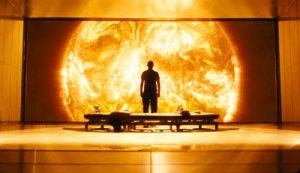 Speaking of space driving people insane... This woefully underrated film from Danny Boyle (of the eclectic films "Trainspotting", "28 Days Later", "Slumdog Millionaire", and "127 Hours") is a twisty, thrilling space ride that blends eye-popping visuals with intelligent action. Some critics believe the film is hampered by a muddy final act, but there's no denying the sheer kinetic power of the film. After a first mission failed under mysterious circumstances, a second group of scientists is sent to reignite our dying Sun with a massive nuclear bomb. But when they stumble across the floating hulk of the first ship, they can't help but investigate -- leading, of course, to terrifying consequences. "Sunshine" features a veritable who's-who of recognizable but not famous actors like a pre-Captain America Chris Evans, "28 Days Later" star Cillian Murphy, and Rose Byrne of "Insidious".
Speaking of space driving people insane... This woefully underrated film from Danny Boyle (of the eclectic films "Trainspotting", "28 Days Later", "Slumdog Millionaire", and "127 Hours") is a twisty, thrilling space ride that blends eye-popping visuals with intelligent action. Some critics believe the film is hampered by a muddy final act, but there's no denying the sheer kinetic power of the film. After a first mission failed under mysterious circumstances, a second group of scientists is sent to reignite our dying Sun with a massive nuclear bomb. But when they stumble across the floating hulk of the first ship, they can't help but investigate -- leading, of course, to terrifying consequences. "Sunshine" features a veritable who's-who of recognizable but not famous actors like a pre-Captain America Chris Evans, "28 Days Later" star Cillian Murphy, and Rose Byrne of "Insidious".
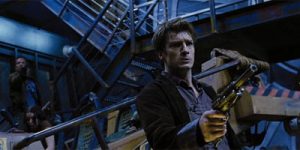 Despite a small-but-passionate cult following, Joss Whedon's sci-fi TV show "Firefly" was axed after only one season. The series from "Buffy The Vampire Slayer" creator (and "The Avengers" director) Whedon was classified as a "space western", and featured a diverse cast of colorful characters, led by Nathan Fillion ("Castle") as Mal. Fan support for the dearly departed "Firefly" led Whedon to wrap up his prematurely-cancelled series with a feature film. The humor, snappy dialogue, and stylized action grounded by very human characters are all distinct Whedon trademarks. It was a surefire hit among the "Firefly" cult, but also gained some new fans through its energy, imagination, and a little bit of political satire.
Despite a small-but-passionate cult following, Joss Whedon's sci-fi TV show "Firefly" was axed after only one season. The series from "Buffy The Vampire Slayer" creator (and "The Avengers" director) Whedon was classified as a "space western", and featured a diverse cast of colorful characters, led by Nathan Fillion ("Castle") as Mal. Fan support for the dearly departed "Firefly" led Whedon to wrap up his prematurely-cancelled series with a feature film. The humor, snappy dialogue, and stylized action grounded by very human characters are all distinct Whedon trademarks. It was a surefire hit among the "Firefly" cult, but also gained some new fans through its energy, imagination, and a little bit of political satire.
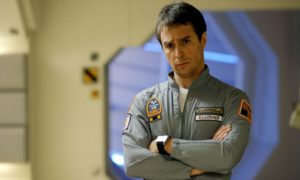 Starring Sam Rockwell ("The Way, Way Back") in what's basically the cinematic version of a one-man play, "Moon" tells the story of an engineer who is living alone on a moon base for a three-year contract. His only companion is the computer, GERTY (voiced by Kevin Spacey). But when inexplicable things start happening (as they always do in space movies), are they just hallucinations caused by his loneliness? Or is there something more sinister going on? "Moon" is anchored by a powerhouse performance by one of America's most dynamic actors and raises thought-provoking questions about what exactly it means to be human.
Starring Sam Rockwell ("The Way, Way Back") in what's basically the cinematic version of a one-man play, "Moon" tells the story of an engineer who is living alone on a moon base for a three-year contract. His only companion is the computer, GERTY (voiced by Kevin Spacey). But when inexplicable things start happening (as they always do in space movies), are they just hallucinations caused by his loneliness? Or is there something more sinister going on? "Moon" is anchored by a powerhouse performance by one of America's most dynamic actors and raises thought-provoking questions about what exactly it means to be human.
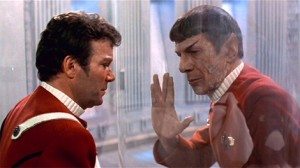 "KHAAAAAAAAAAN!" This tale of Kirk, Spock & Co. facing off against their genetically-engineered arch enemy Khan Noonien Singh is inarguably the most beloved film of the original "Trek" series. It features the crew of the Enterprise trying to stop Khan from acquiring a powerful terraforming device called Genesis and turning it into a weapon. The effects are endearingly cheap, and the acting is at times delightfully hammy, but a faster pace, increased tension, and a superb performance by Ricardo Montalban as Khan make this a far superior film than its predecessor, and a high point of the franchise that would never again be matched. And what Trekkie didn't tear up when Spock told Kirk "I have been, and always shall be, your friend" and put his hand on that glass?
"KHAAAAAAAAAAN!" This tale of Kirk, Spock & Co. facing off against their genetically-engineered arch enemy Khan Noonien Singh is inarguably the most beloved film of the original "Trek" series. It features the crew of the Enterprise trying to stop Khan from acquiring a powerful terraforming device called Genesis and turning it into a weapon. The effects are endearingly cheap, and the acting is at times delightfully hammy, but a faster pace, increased tension, and a superb performance by Ricardo Montalban as Khan make this a far superior film than its predecessor, and a high point of the franchise that would never again be matched. And what Trekkie didn't tear up when Spock told Kirk "I have been, and always shall be, your friend" and put his hand on that glass?
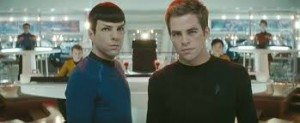 The best of the old franchise and the best of the new are so closely matched that this "Trek" movie wins on this list solely by virtue of being more space-centric. J.J. Abrams ("Lost", "Mission: Impossible III") succeeded beyond anyone's wildest imaginations at rebooting and reinvigorating an old franchise and introducing it to a whole new generation of fans. Gone were the long scenes of characters sitting around tables discussing alien politics; in were more lens flares and mid-space battles. Some old-school Trekkies decried this emphasis on action and special effects, but for the most part Abrams was praised for providing an entertaining blockbuster while staying true to the spirit of the franchise. Bonus points go to this film for providing the most clever reboot in cinema history: a wormhole creates an alternate timeline, which allows the writers to send the characters on new adventures without pretending like the events of the original series had never happened.
The best of the old franchise and the best of the new are so closely matched that this "Trek" movie wins on this list solely by virtue of being more space-centric. J.J. Abrams ("Lost", "Mission: Impossible III") succeeded beyond anyone's wildest imaginations at rebooting and reinvigorating an old franchise and introducing it to a whole new generation of fans. Gone were the long scenes of characters sitting around tables discussing alien politics; in were more lens flares and mid-space battles. Some old-school Trekkies decried this emphasis on action and special effects, but for the most part Abrams was praised for providing an entertaining blockbuster while staying true to the spirit of the franchise. Bonus points go to this film for providing the most clever reboot in cinema history: a wormhole creates an alternate timeline, which allows the writers to send the characters on new adventures without pretending like the events of the original series had never happened.
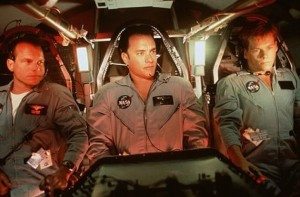 "Houston, we've got a problem." "Apollo 13" is perhaps the film that cemented Ron Howard as a director to watch for. It's the only true story on the list, and yet it's still somehow one of the most intense and exciting space films ever made. Sometimes reality is crazier than the imagination, as was the case when this mission to the moon went horrifically wrong, stranding three astronauts in space with little hope of a successful return to Earth. Starring Tom Hanks, Kevin Bacon, and Bill Paxton as the ill-fated astronauts, this is a harrowing account of desperate measures taken in extraordinary circumstances. Somehow, knowing the end of the story doesn't make the film any less of a nail-biter.
"Houston, we've got a problem." "Apollo 13" is perhaps the film that cemented Ron Howard as a director to watch for. It's the only true story on the list, and yet it's still somehow one of the most intense and exciting space films ever made. Sometimes reality is crazier than the imagination, as was the case when this mission to the moon went horrifically wrong, stranding three astronauts in space with little hope of a successful return to Earth. Starring Tom Hanks, Kevin Bacon, and Bill Paxton as the ill-fated astronauts, this is a harrowing account of desperate measures taken in extraordinary circumstances. Somehow, knowing the end of the story doesn't make the film any less of a nail-biter.
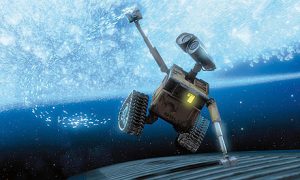 This beloved Pixar film may be best remembered for its extended, Earth-bound prologue depicting the courtship between robots Wall-E and EVE, but the bulk of the film takes place in outer space, aboard the massive spaceship Axiom. While "Wall-E" is undoubtedly a delightful animated film that pleases both children and adults, it's also a fairly terrifying depiction of the future of humanity. Earth has been literally inundated with garbage, forcing humans into self-imposed exile, where they're grown fat and sedentary, bobbing around on floating lawn chairs and communicating solely through screens, even when sitting next to each other. It's a pretty bleak social critique, and a bold one to make to a theater full of people sitting in cushy chairs and watching something on a screen. Kudos to Pixar for crafting such a beautiful film that succeeds as one of the best animated films of all time, one of the most affecting romances, and one of the most eye-opening predictions of the future of our culture.
This beloved Pixar film may be best remembered for its extended, Earth-bound prologue depicting the courtship between robots Wall-E and EVE, but the bulk of the film takes place in outer space, aboard the massive spaceship Axiom. While "Wall-E" is undoubtedly a delightful animated film that pleases both children and adults, it's also a fairly terrifying depiction of the future of humanity. Earth has been literally inundated with garbage, forcing humans into self-imposed exile, where they're grown fat and sedentary, bobbing around on floating lawn chairs and communicating solely through screens, even when sitting next to each other. It's a pretty bleak social critique, and a bold one to make to a theater full of people sitting in cushy chairs and watching something on a screen. Kudos to Pixar for crafting such a beautiful film that succeeds as one of the best animated films of all time, one of the most affecting romances, and one of the most eye-opening predictions of the future of our culture.
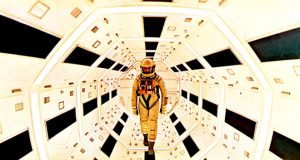 Also sprach Zarathustra. Giant black monoliths. An evil computer. A Star-Child. Everything about Stanley Kubrick's trippy space epic has become iconic since it came out in 1968. Written with legendary sci-fi author Arthur C. Clarke (who published the novel with the same name concurrently with the film's release), "2001" often feels more like a cinematic tone poem than a film, a fact that will test the patience of some viewers used to their space movies coming with lots of explosions. But for sheer scope and ambition, "2001" is very nearly a masterpiece. Themes of evolution and artificial intelligence interwoven with ambiguous imagery and minimal dialogue make for a head-spinning viewing experience that you're not likely to forget. It's also responsible for crafting one of the most chilling villains in film history, with the malfunctioning, emotionless, red-eyed computer HAL 9000.
Also sprach Zarathustra. Giant black monoliths. An evil computer. A Star-Child. Everything about Stanley Kubrick's trippy space epic has become iconic since it came out in 1968. Written with legendary sci-fi author Arthur C. Clarke (who published the novel with the same name concurrently with the film's release), "2001" often feels more like a cinematic tone poem than a film, a fact that will test the patience of some viewers used to their space movies coming with lots of explosions. But for sheer scope and ambition, "2001" is very nearly a masterpiece. Themes of evolution and artificial intelligence interwoven with ambiguous imagery and minimal dialogue make for a head-spinning viewing experience that you're not likely to forget. It's also responsible for crafting one of the most chilling villains in film history, with the malfunctioning, emotionless, red-eyed computer HAL 9000.
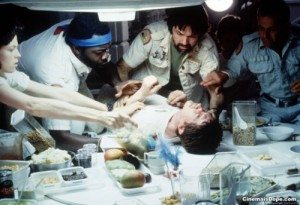 Without a doubt the scariest space movie ever made. While James Cameron upped the ante in "Aliens" with a bigger scope and increased action, most of that film took place on the planet LV-246, disqualifying it from the race. But sometimes smaller is actually better, as evidenced by the claustrophobic thrills of "Alien". Confined to a small metal box hurtling through outer space, there are only so many places you can hide from a knife-tongued, acid-blooded, homicidal xenomorph. "Alien" features some of the most famous sci-fi shocks of all time, including the freakish facehugger and, of course, the bloody chestburster. Sigourney Weaver, then a relative unknown, was launched to fame as the resourceful "final girl" who matches wits with the terrifying creature. The exquisitely slow build-up of the film's first 45 minutes expertly ratchets up the tension to an almost unbearable point...until it explodes in a horrifying bloodbath. "Alien" is the rare horror film that can be admired not only for its gruesome creature designs but also for its pervasive Freudian undertones.
Without a doubt the scariest space movie ever made. While James Cameron upped the ante in "Aliens" with a bigger scope and increased action, most of that film took place on the planet LV-246, disqualifying it from the race. But sometimes smaller is actually better, as evidenced by the claustrophobic thrills of "Alien". Confined to a small metal box hurtling through outer space, there are only so many places you can hide from a knife-tongued, acid-blooded, homicidal xenomorph. "Alien" features some of the most famous sci-fi shocks of all time, including the freakish facehugger and, of course, the bloody chestburster. Sigourney Weaver, then a relative unknown, was launched to fame as the resourceful "final girl" who matches wits with the terrifying creature. The exquisitely slow build-up of the film's first 45 minutes expertly ratchets up the tension to an almost unbearable point...until it explodes in a horrifying bloodbath. "Alien" is the rare horror film that can be admired not only for its gruesome creature designs but also for its pervasive Freudian undertones.
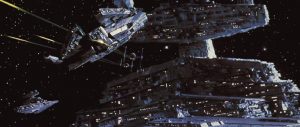 There can't be a list of space films without including the original "Star Wars" trilogy. In fact, almost none of the films on the list would even exist, or at least have been nearly as successful, without "Star Wars" paving the way. (The only movie on this list that was made before "Star Wars" is "2001".) With this trilogy, George Lucas managed to re-spark interest in the space genre, previously dismissed due to kitschy films limited by cheap effects. There was no reason to think that this "space opera" would be successful either. But thanks to the appeal of its stars, the impressive visual effects, and the well-drawn mythology of Jedis and evil Emperors, "A New Hope" exploded onto the scene in 1977...and the rest is history. It is still probably the most universally-known trilogy in film history, referenced and parodied countless times, with a third trilogy on its way to us in 2015 (from "Star Trek" director J.J. Abrams). Sure, a lot of what made "Star Wars" so famous were its exotic planets like Tatooine and Dagobah, but it was equally well-known for that slow-crawl text superimposed over a star-studded backdrop; the scenes of imposing Star Destroyers gliding silently through space; the dogged Millennium Falcon evading pursuit by entering an asteroid field; the moon-like Death Star hovering menacingly above vulnerable planets. Never before had space seemed so full of action, romance, and mystery. While most space movies exploit that vast unknown for its innate terror, "Star Wars" tapped the stars for their limitless potential for adventure, and whisked audiences away for a journey they would never forget.
There can't be a list of space films without including the original "Star Wars" trilogy. In fact, almost none of the films on the list would even exist, or at least have been nearly as successful, without "Star Wars" paving the way. (The only movie on this list that was made before "Star Wars" is "2001".) With this trilogy, George Lucas managed to re-spark interest in the space genre, previously dismissed due to kitschy films limited by cheap effects. There was no reason to think that this "space opera" would be successful either. But thanks to the appeal of its stars, the impressive visual effects, and the well-drawn mythology of Jedis and evil Emperors, "A New Hope" exploded onto the scene in 1977...and the rest is history. It is still probably the most universally-known trilogy in film history, referenced and parodied countless times, with a third trilogy on its way to us in 2015 (from "Star Trek" director J.J. Abrams). Sure, a lot of what made "Star Wars" so famous were its exotic planets like Tatooine and Dagobah, but it was equally well-known for that slow-crawl text superimposed over a star-studded backdrop; the scenes of imposing Star Destroyers gliding silently through space; the dogged Millennium Falcon evading pursuit by entering an asteroid field; the moon-like Death Star hovering menacingly above vulnerable planets. Never before had space seemed so full of action, romance, and mystery. While most space movies exploit that vast unknown for its innate terror, "Star Wars" tapped the stars for their limitless potential for adventure, and whisked audiences away for a journey they would never forget.
What's your favorite space movie? Where do you think "Gravity" will end up on this list? Tweet us @Stagebuddy and let us know your thoughts!